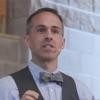Joshua Pauling (JP): Thank you, Jeff, for agreeing to discuss your new book, Reading the Times: a Literary and Theological Inquiry into the News. To start, the book has an interesting origin—what was the impetus for writing the book?
Jeffrey Bilbro (JB): This is somewhat ironic, but as I acknowledge in the preface, the catalyst for this book was a Tweet. However, I’ve been thinking about related themes for many years. One influence is my reading and writing related to Wendell Berry and the broader conversation around the weakening of communities in recent decades. The other major influence is a book project I’m still in the middle of about how literary authors in nineteenth-century America responded to shifts in print technologies. This interest of mine is why I draw on people like Henry David Thoreau and Frederick Douglass at key junctures in the book. I do hope that the book is “timely,” but it’s really about perennial human questions related to how we understand our times and the role news plays in shaping our souls and our communities.
JP: How would you briefly explain your thesis—what is your 30-second elevator speech for the book?
JB: In the preface, I articulate the central question that this book tries to address (I don’t pretend to have fully answered it!): “What do we need to know to love our neighbors well? Or, to frame the question differently, to what do we need to attend in order to live faithfully in this place and in this time?” I suppose that question summarizes the book as well as anything.
JP: Indeed, that is an important question. As you answer this central question throughout the book, you frame your argument by considering three main concepts: Attention, Time, and Community. Why these three?
JB: The first section that I wrote was actually the section on Time. Given the literal meaning of “news,” that seemed like a subject I had to address, and as I argue, our cultural feel for time has much to do with the role that the news plays in our lives. Attention also seemed like an essential topic, and much has been written in the last decade or so regarding the effects of different forms of attention. I tried to build on this recent, digitally-focused work while also drawing on older sources regarding the importance of what and how we attend. And my thinking about Berry and place and community led me to also want to focus on Community. Many people are now concerned about political polarization and partisanship—and the role that news outlets play in these dynamics—but once again the issues aren’t new. How we belong to one another fundamentally shapes what news we think is worth engaging.
JP: As you say, these issues aren’t new. You explain in the section on Attention, that our times aren’t as “unprecedented” as we frequently assume. Make the case for this briefly, and for the importance of exercising historical humility in this regard.
JB: My first chapter in this section is indebted to Thoreau, who warned in the mid nineteenth century that “the mind can be permanently profaned by the habit of attending to trivial things, so that all our thoughts shall be tinged with triviality.” The phenomena that Nicholas Carr writes about in The Shallows may be more pronounced today, but it’s a long-standing issue.
JP: Having our thoughts “tinged with triviality” is so easy with the immediacy of modern media, which relates to your discussion of time. In the section on Time, you make an important distinction between kairos and chronos. Could you explain this difference and why it matters?
JB: These two Greek words name two different ways that we might experience time. Chronos just refers to time as duration or sequence, and kairos names a seasonal, cyclic kind of time: it’s the right time to plant tomatoes or to make dinner or to go to war. For much of human history, kairos provided the dominant frame of reference; it’s only been in the last 1500 years or so that most people even had a commonly agreed upon system of naming the date. For a variety of reasons—both technological and philosophical—we now inhabit a world dominated by chronos. The problem is that a strictly chronological frame of reference isn’t sufficient to make sense of all the events that take place on a given date. Drawing on a variety of biblical examples, the Old Testament prophets in particular, I argue that Christians need to cultivate the ability to interpret the events of chronos in reference to the drama of God’s action in history—creation, fall, redemption, restoration—a drama that takes place in kairos time.
JP: To cultivate a kairos mindset in a chronos world, you use the term liturgy to help us consider how to develop more fruitful habits in relation to news and media consumption. Can you unpack this usage of liturgy a bit further? Why are habits as, or perhaps more, important than logical thinking or rational decision-making?
JB: Sometimes people think that all the so-called “problems” relating to the news—misinformation, fake news, media bias, etc.—would be fixed if we just have more and better information. But as work by people such as Jonathan Haidt and Daniel Kahneman suggests, these symptoms have deeper origins. In particular, most of our reactions and decisions flow from our intuitions and prejudices rather than being the outcome of careful, rational thinking. This isn’t a particularly new insight: Gadamar defends the role that prejudice plays in interpretation, and Augustine famously argues that he has to order his loves rightly before he will be able to think rightly about God. In recent years, Jamie Smith, Tish Harrison Warren, and others have reminded us that healthy habits and liturgies play a crucial role in shaping our loves and forming our intuitions. As we scroll through a news site or watch a TV broadcast, we’re not just getting information, we’re also forming our souls. So my discussions of practices that might offer better ways of reading the times are, perhaps, the most important sections of the book.
JP: I like how you put that; “we’re not just getting information, we’re also forming our souls.” There are many authors that you interact with to build your case throughout the book, but I couldn’t help but notice the role of Wendell Berry, especially considering your many years of scholarship engaging with Berry and his work. Why is Wendell Berry such an important thinker for us to consider?
JB: I think Berry models the rooted posture I commend in this book. My colleague Jack Baker and I wrote briefly about how we see Berry drawing on the Psalm 1 picture of the blessed man as a rooted tree, and this image is my paradigmatic example of healthy attention. Berry is able to speak incisively about contemporary events and issues precisely because he is formed by his place, his community, and a long tradition of wise writers. While Berry is famous (or infamous?) for not owning a computer and standing outside of the 24/7 news cycle, I cite his poem “To A Siberian Woodsman” as just one example of how he models a charitable, thoughtful form of engagement with the news.
JP: On that note of a rooted posture in a community, you also are editor-in-chief at Front Porch Republic. I think Modern Reformation readers would be interested in hearing more about FPR and its purpose and work. Can you share a bit?
JB: FPR isn’t an explicitly religious publication, but we do publish essays on religious topics pretty regularly. What unites the contributors there is a commitment to localism or, in the words of our tagline, place, limits, and liberty. Wendell Berry is in many ways the patron saint of the Porch. FPR has also provided me with a vibrant intellectual community in recent years. It gives me hope that the Internet can host healthy discussions that in turn shape us to respond to the issues of our day and the needs of our communities with wisdom and love.
JP: In conclusion, I’m sure you’re always experimenting with new ideas as a scholar and writer. What is your next writing project? And what would you say is something Christians from across the denominational landscape should be considering that we are overlooking?
JB: I’m sure I’ll continue to think and write about issues related to Berry and how Christians should understand our responsibilities to the rest of Creation. For now, I’ve turned my attention back to my larger book project on nineteenth-century American print culture, which is tentatively titled Imagining Convivial Readers: What a Digital Age Can Learn from Antebellum Literature. One of the seminal essays I returned to while working on this book was Alan Jacobs’s “Habits of Mind in an Age of Distraction.” My book on the news tries to address some of the issues that Jacobs raises in this essay, but I expect I will continue to wrestle with them as a writer, a teacher, and a member of the church.
JP: You’ve tied together so many important strands that are both timely and timeless in the book and in this interview. Thank you, Jeff, for discussing your book, and more importantly, for writing it—and congratulations on the new position at Grove City College.
Joshua Pauling teaches high school history, and was educated at Messiah College, Reformed Theological Seminary, and Winthrop University. In addition to Modern Reformation, Josh has written for Areo Magazine, Front Porch Republic, Mere Orthodoxy, Public Discourse, Quillette Magazine, Salvo Magazine, andThe Imaginative Conservative. He is also head elder at All Saints Lutheran Church (LCMS) in Charlotte, North Carolina.
Jeffrey Bilbro (PhD, Baylor University) is the editor-in-chief of Front Porch Republic and associate professor of English at Grove City College. He is also the author of Loving God’s Wildness: The Christian Roots of Ecological Ethics in American Literature, Virtues of Renewal: Wendell Berry’s Sustainable Forms, and coauthor (with Jack Baker) of Wendell Berry and Higher Education: Cultivating Virtues of Place.




